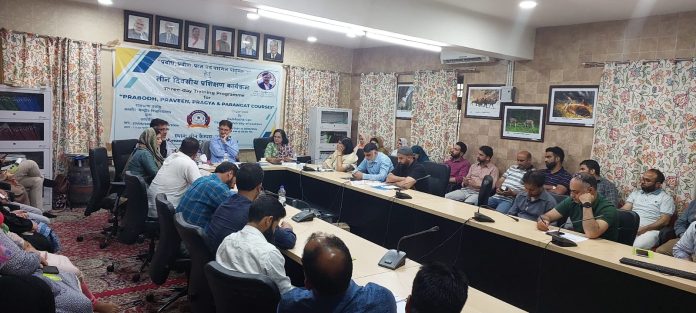GANDERBAL: The three-day Rajbhasha training programme for the administrative staff of the Central University of Kashmir (CUKashmir) and other Central Government employees, registered in different correspondence courses of Prabodh, Praveen, Pragya and Parangat, beganat varsity’s Green Campus here on Monday.
Addressing the participants, I/c Vice-Chancellor and Head Department of Management Studies, Prof. Abdul Gani, said that languages, across the world, do not belong to any particular religion, sect, community or ethnicity. “Language plays a key role in binding people and people should learn as many languages and their literature as possible,” Prof. Abdul Gani remarked while inaugurating the three-day event. He said the adoption of Hindi in government communications (both internal and external) enhances administrative efficiency by streamlining processes, minimizing language barriers, and facilitating better understanding among various stakeholders. “This efficiency is instrumental in improving service delivery, enhancing transparency, and strengthening the bond of trust between the government and its citizens,” he said. “The expert will conduct the sessions, providing valuable insights, tips, and techniques to enhance language proficiency effectively.” Prof. Gani said the Vice-Chancellor, Prof. A Ravinder Nath, was keen in promoting Hindi in official communication channels as it enhances clarity and accessibility, especially for stakeholders who are more comfortable communicating in Hindi.
Speaking on the occasion, Dean School of Languages and Head, Department of English, Prof. Sandhya Tiwari, said, Hindi is not merely a language; it is a repository of India’s rich cultural heritage and historical legacy. “Through its usage in official communications, the government departments demonstrate respect for the linguistic heritage of the nation and acknowledge the cultural identity of its people,” she said. Prof. Sandhya further said that through this initiative, the varsity reaffirms its commitment to promote linguistic diversity, cultural inclusivity, and effective communication within its academic and administrative domains.
In his speech, Registrar, Prof. M Afzal Zargar, said the training programme seeks to enhance the proficiency of participants in Hindi language skills, including reading, writing, and speaking, thereby promoting the use of Hindi in official communication and administration. He said the majority of the administrative staff of the university have passed all the programmes Prabodh, Praveen, Pragya and Parangat and are actively using Hindi in official communications. He further added that modern technology is playing a pivotal role in promotion of Rajbhasha Hindi and the university employees can seek help from the available online resources for completing their official work in Hindi language.
Expert, Dr. V. P Radhika, Head of the Department, Official Language, Ministry of Home Affairs, appreciated the university administration for encouraging all departments, faculty, and staff members to actively participate in and support the promotion of Hindi in official work. She said that Hindi’s widespread usage and familiarity make it accessible to a vast majority of Indians, irrespective of their mother tongue. “By employing Hindi in official communications, the government has ensured inclusivity, enabling citizens from various linguistic backgrounds to participate actively in governance and public discourse,” she further said.
Hindi Adhikari, Dr. Sakina Akhtar, conducted the programme, and said the Rajbhasha cell is continuously organising such training programmes to sensitise the administrative staff about the usage of Hindi in official communications.
Asst Librarian, Dr. Tariq Ahmad Shah proposed the vote of thanks.


